【人教八下英语情境课堂课件内嵌音视频】Unit 2 Section A 1a~2d
文档属性
| 名称 | 【人教八下英语情境课堂课件内嵌音视频】Unit 2 Section A 1a~2d |  | |
| 格式 | pptx | ||
| 文件大小 | 70.7MB | ||
| 资源类型 | 试卷 | ||
| 版本资源 | 人教新目标(Go for it)版 | ||
| 科目 | 英语 | ||
| 更新时间 | 2025-02-21 11:32:07 | ||
图片预览

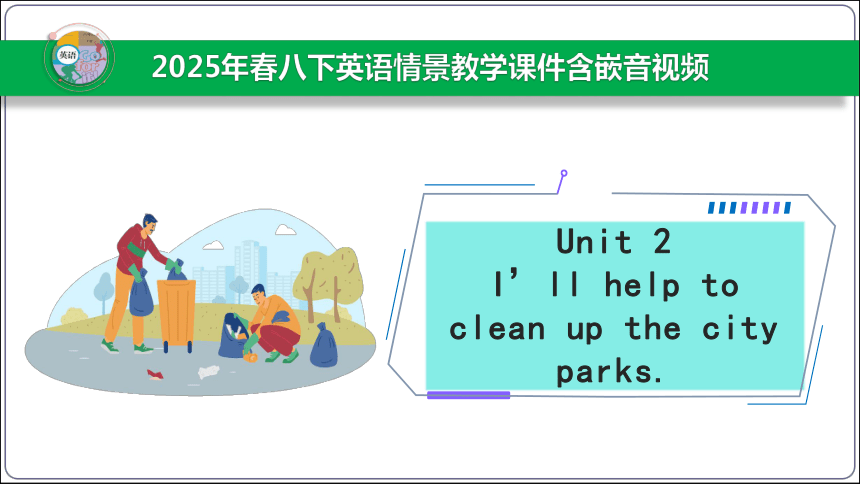
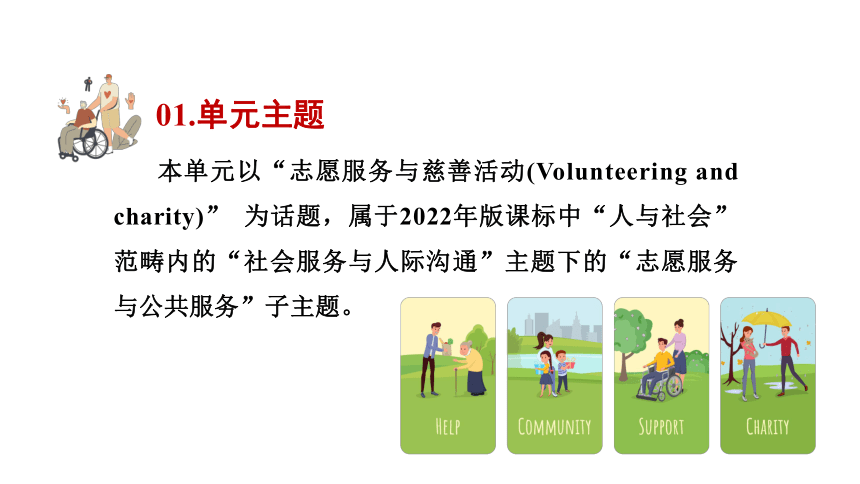
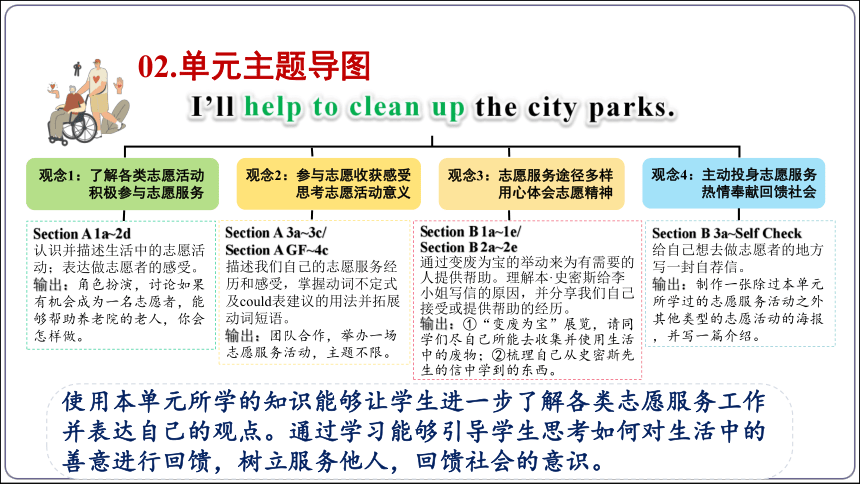
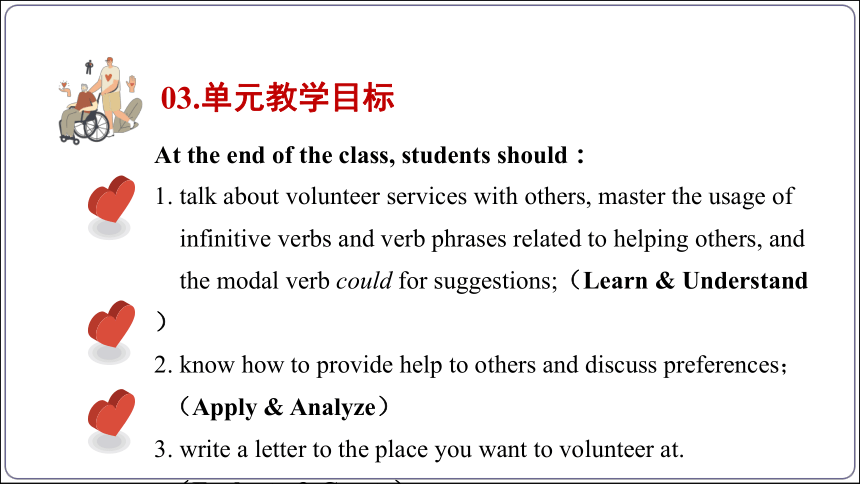
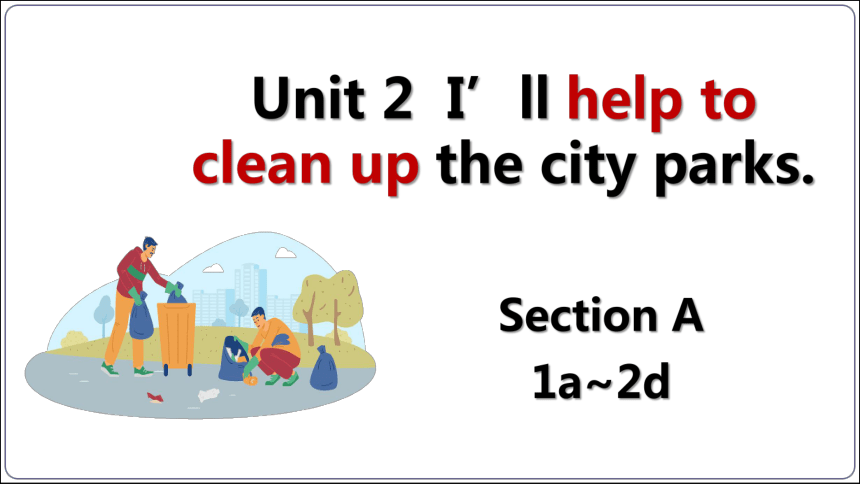
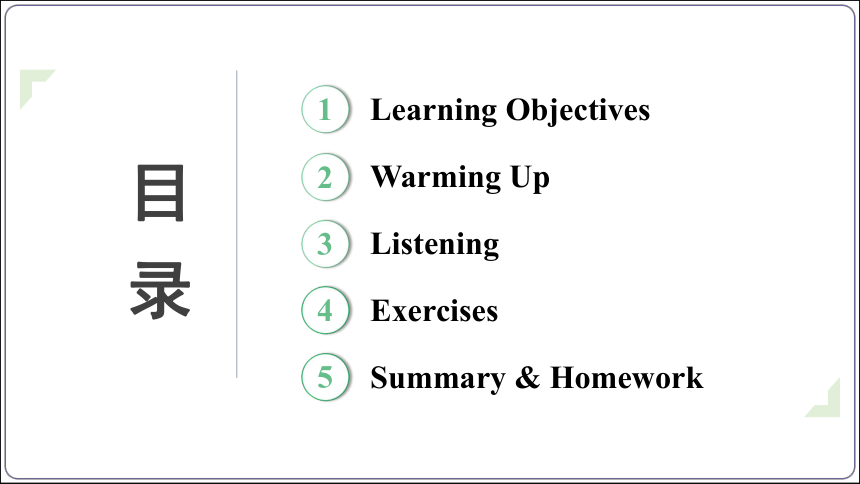
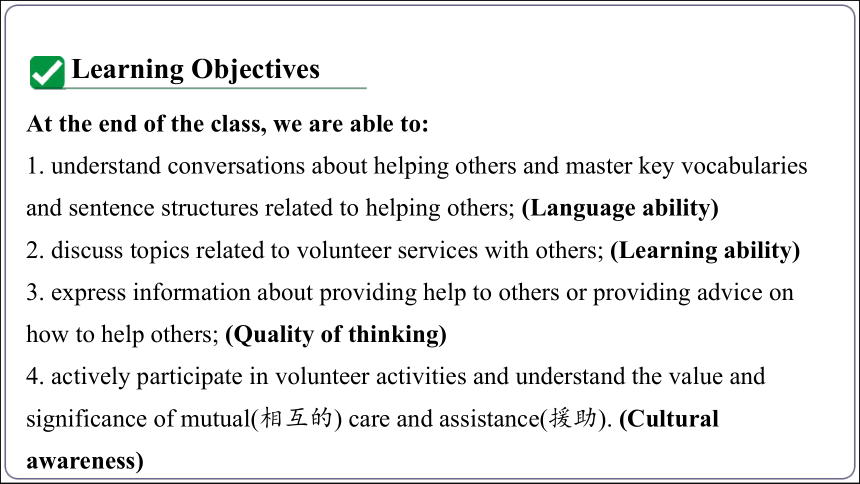
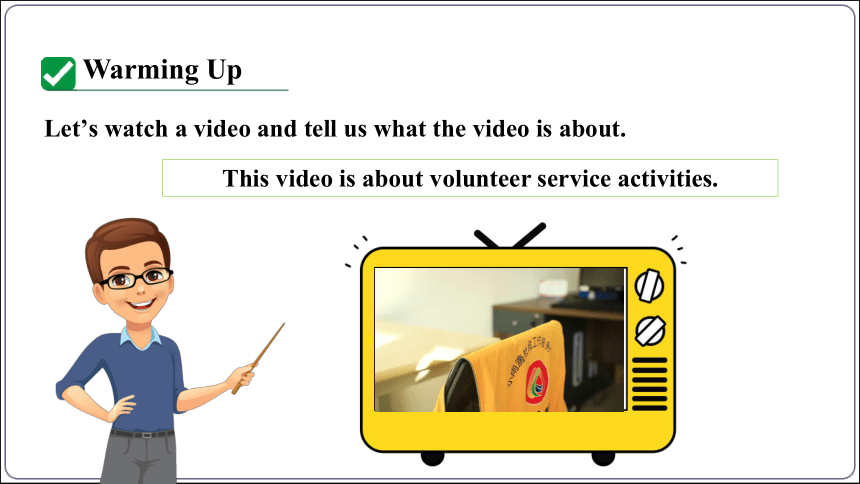
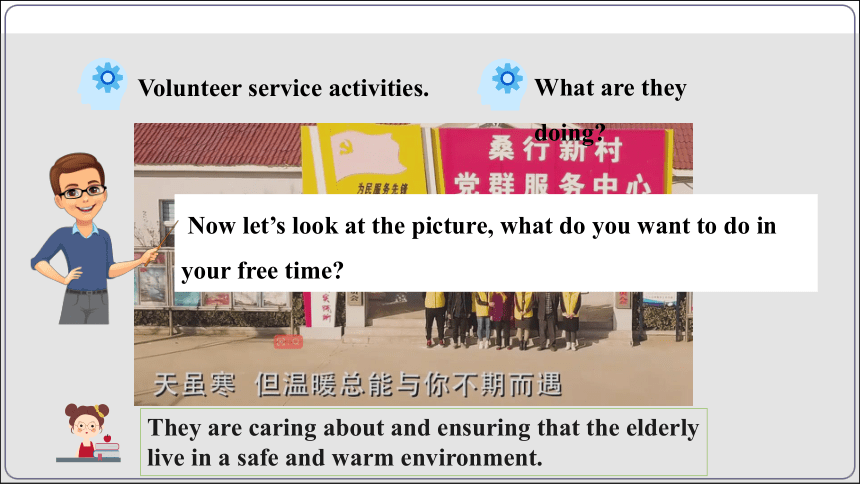
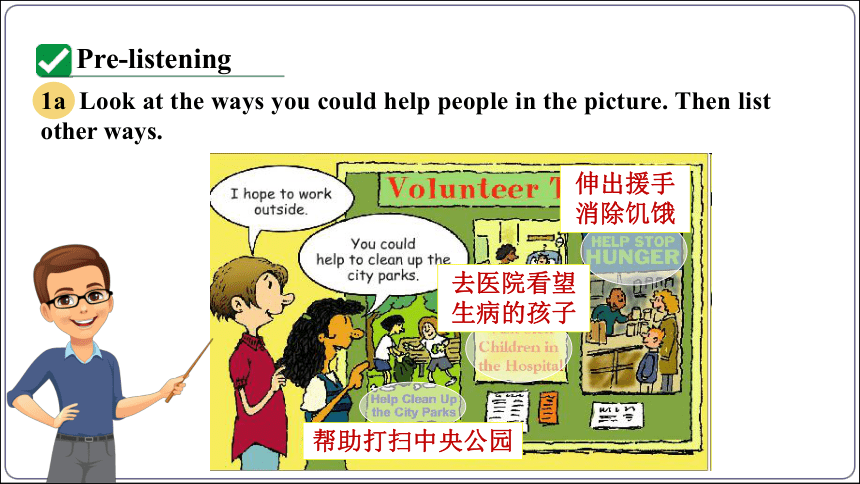
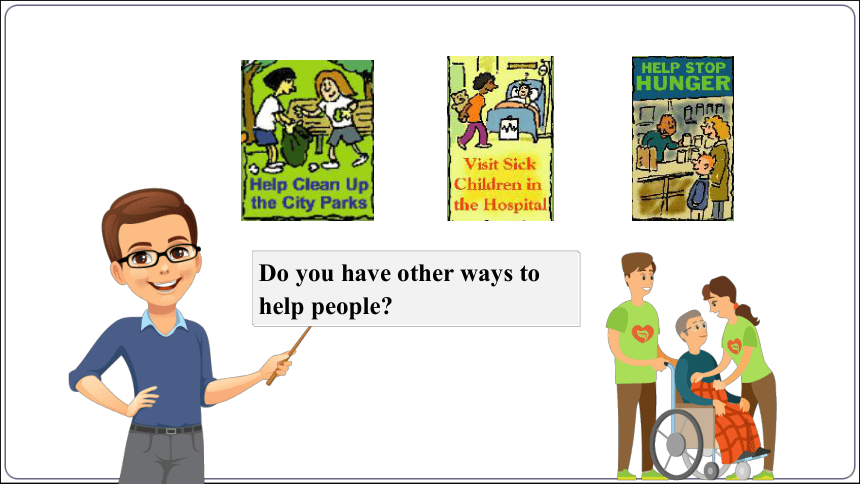
文档简介
(共49张PPT)
统编八下英语
同步精品课件
人教版八年级下册
2025年春八下英语情景教学课件含嵌音视频
Unit 2
I’ll help to clean up the city parks.
01.单元主题
本单元以“志愿服务与慈善活动(Volunteering and charity)” 为话题,属于2022年版课标中“人与社会”范畴内的“社会服务与人际沟通”主题下的“志愿服务与公共服务”子主题。
02.单元主题导图
I’ll help to clean up the city parks.
观念1:了解各类志愿活动
积极参与志愿服务
观念4:主动投身志愿服务
热情奉献回馈社会
观念2:参与志愿收获感受
思考志愿活动意义
观念3:志愿服务途径多样
用心体会志愿精神
Section A 1a~2d
认识并描述生活中的志愿活动;表达做志愿者的感受。
输出:角色扮演,讨论如果有机会成为一名志愿者,能够帮助养老院的老人,你会怎样做。
Section A 3a~3c/
Section A GF~4c
描述我们自己的志愿服务经历和感受,掌握动词不定式及could表建议的用法并拓展动词短语。
输出:团队合作,举办一场志愿服务活动,主题不限。
Section B 1a~1e/
Section B 2a~2e
通过变废为宝的举动来为有需要的人提供帮助。理解本·史密斯给李小姐写信的原因,并分享我们自己接受或提供帮助的经历。
输出:①“变废为宝”展览,请同学们尽自己所能去收集并使用生活中的废物;②梳理自己从史密斯先生的信中学到的东西。
Section B 3a~Self Check
给自己想去做志愿者的地方写一封自荐信。
输出:制作一张除过本单元所学过的志愿服务活动之外其他类型的志愿活动的海报,并写一篇介绍。
使用本单元所学的知识能够让学生进一步了解各类志愿服务工作并表达自己的观点。通过学习能够引导学生思考如何对生活中的善意进行回馈,树立服务他人,回馈社会的意识。
03.单元教学目标
At the end of the class, students should:
1. talk about volunteer services with others, master the usage of
infinitive verbs and verb phrases related to helping others, and
the modal verb could for suggestions;(Learn & Understand)
2. know how to provide help to others and discuss preferences;
(Apply & Analyze)
3. write a letter to the place you want to volunteer at.
(Evaluate & Create)
Section A 1a~2d
Unit 2 I’ll help to clean up the city parks.
目 录
1
Learning Objectives
2
Warming Up
3
Listening
5
Summary & Homework
4
Exercises
At the end of the class, we are able to:
1. understand conversations about helping others and master key vocabularies and sentence structures related to helping others; (Language ability)
2. discuss topics related to volunteer services with others; (Learning ability)
3. express information about providing help to others or providing advice on how to help others; (Quality of thinking)
4. actively participate in volunteer activities and understand the value and significance of mutual(相互的) care and assistance(援助). (Cultural awareness)
Learning Objectives
Let’s watch a video and tell us what the video is about.
Warming Up
This video is about volunteer service activities.
They are caring about and ensuring that the elderly live in a safe and warm environment.
Now let’s look at the picture, what do you want to do in your free time
Volunteer service activities.
What are they doing
1a Look at the ways you could help people in the picture. Then list other ways.
帮助打扫中央公园
去医院看望生病的孩子
伸出援手
消除饥饿
Pre-listening
Do you have other ways to help people
Outside school At school
teach the kids in the poor area
give away clothes
raise money
work in an old people’s home
clean up street lights
clean the chairs in the park
help clean the blackboard
help the teacher to collect and give out exercise books
help classmates to learn their lessons
...
Do you have other ways to help people
1b Listen and number the ways the boy and girl could help others.
The girl could visit the sick kids in the hospital to cheer them up.
The boy could give out food at the food bank.
The girl could volunteer in an after school study program to teach kids.①
The boy could help to clean up the city parks.
3
2
4
1
While-listening
v. /t / cheer (sb.) up
give out sth.
v. / v l n t (r)/
clean up sth.
Click to learn more!
Let’s listen and fill in the blanks.
Conversation 1
Boy 1: I ________________________.
Girl 1: You could help to _____________________.
hope to work outside
clean up the city parks
hope to do sth.
help to do sth.
help sb. with sth.
help sb. in doing sth.
Conversation 2
Boy 2: I’d like to___________________.
Girl 1: You could __________ food at the food bank to _______________.
help homeless people
give out
help feed them
would like to do sth.
Conversation 3
Girl 2: I want to _________________.
Girl 1: You could ask hospitals to __________________.
cheer up sick kids
let you visit the kids
Conversation 4
Girl 1:______________________________________.
Girl 2: You could volunteer in an after-school study program to teach kids.
I’d like to help kids with their schoolwork
would like to do sth.
1c Practice the conversation in the picture above. Then make other conversations using the information in 1b.
I hope to work outside.
You could help to visit the sick kids in the hospital to cheer them up.
That’s a good idea!
You could also give out food at the food bank.
Let’s read and translate these phrases.
put up some signs
put an ad on TV
call up friends
在电视上投放一则广告
张贴一些标语
打电话给朋友
n. /sa n/
call (sb.) up
分发通知
在报纸上刊登广告
hand out notices
put an ad in the newspaper
n. / n t s/
2a A group of students are planning a City Park Clean-Up Day.
Listen and check (√) the things they are going to do to tell
people about it.
2b Listen again. Fill in the blanks.
1. We need to ________ ________ _______ a plan to tell people about the
city park clean up.
2. Clean-Up Day is only two weeks from now. We can’t ______ ________
making a plan.
3. We could ________ ________ signs.
4. Let’s make some notices, too. Then I’ll _______ them ______ after
school.
5. We could each ______ ______ 10 students and ask them to come.
come up with
put off
put up
hand out
call up
Conversation
Boy 1: Now we need to come up with a plan to tell people about the
city park clean-up.
Girl 1: Yeah, but I’m hungry, Bob. Let’s have lunch first.
Girl 2: No, we need to start now. Clean-up Day is only two weeks
from now.
Boy 2: You’re right, Sally. We can’t put off making a plan. As we talk,
I’ll write down all our ideas. Then we can decide which ideas are best.
come up with sth.
put (sth.) off
tell sb. about sth.
which引导的宾语从句
Girl 1: Um…well…we could put up signs.
Boy 2: That’s a good idea!
Girl 2: Let’s make some notices, too. Then I’ll hand them out
after school.
Boy 1: OK. Great! And we could each call up 10 students and ask
them to come.
Boy 2: Hey, we’re coming up with a lot of good ideas, aren’t we
hand (sth.) out
We need to come up with a plan for the City Park Clean-Up Day.
Let’s have lunch first.
No, we need to start now. Clean-Up Day is only two weeks from now.
Okay!
2c Make a conversation using the information in 2a and 2b.
Let’s read the conversation in 2d and answer
the following questions.
1. Where’s Helen going to work this summer
2. What did Tom do in the old people’s home
She’s going to work in an old people’s home.
He read the newspaper and talked to the old people.
3. How do most old people feel
4. Why do Tom and Helen think that we should listen to and care for the old people
They are lonely.
Because a lot of old people are lonely and we’re all going to be old one day, too.
Listen and read the conversation and pay attention to the phrases.
Helen: Hi, Tom. I’m making some plans to work in an old people’s home this summer.
Tom: Really I did that last summer!
Helen: Oh, what did they ask you to help out with
Tom: Mm... things like reading the newspaper to the old people, or just talking to them. They told me stories about the past and how things used to be.
tell sb. sth.
tell sth. to sb.
used to...
used to do sth.
be/get used to (doing) sth.
be used to do sth.=be used for doing sth.
Helen: That sounds interesting.
Tom: Yeah, a lot of old people are lonely.② We should listen to them and
care for them.
Helen: You’re right. I mean, we’re all going to be old one day, too.
adj. / l nli/
a lot of=lot of
care for=look after
A: Hello. Amy! I didn’t see you yesterday afternoon. 1. ______________ _______________
B: We went to the old people’s home.
A: Wow! Sounds nice. 2. ______________________________________
B: Kind of tired. But I was glad to be a volunteer.
A: A volunteer I did that last summer. 3. _________________________
___________________________________________
中考链接
(2d 情境迁移)Fill in the blanks according to the conversation.
How were you feeling/How did you feel
How did you help the old people/What did you do to help the old people
Where did
you go
B: Mm... We did lots of things such as reading newspapers to them, cleaning the room or just talking to them.
A: 4. __________________________________________________________.
B: Yeah, very happy. The old people also told us stories about the past.
A: Listening to them carefully is important, too. A lot of old people are lonely.
B: You’re right. Helping others is a great thing.
A: 5. ___________________________________. We can learn new things and have fun at the same time.
You must have a good/great/happy time/enjoy yourself/...
I (totally) agree with you/I do agree/...
Work in pairs. Make a conversation about volunteer work. You can use the conversation in 2d as model.
Post-listening
帮助做某事 ____________________
(使)变得高兴;振奋起来 _____________________
分发;散发 _____________________
希望做某事;盼望做某事 ______________________
打扫(或清除)干净 _______________________
想要做某事 /愿意做某事 ________________________
提出;想出 ________________________
help to do sth.
cheer up
give out
hope to do sth.
clean up
would like to do sth.
come up with
Key Phrases
吃午饭,吃午餐 __________________
推迟 __________________
制定计划 __________________
写下 __________________
一个好主意 __________________
分发 __________________
hand out
put off
have lunch
make a plan
write down
a good idea
一家养老院 _______________________
看报纸;读报纸 _______________________
许多 _______________________
照顾 _______________________
an old people’s home
read the newspaper
a lot of
care for
1. The girl could volunteer in an after school study program to teach kids.
① volunteer 作动词,意为“自愿做;义务做;无偿做”
volunteer (sth.) (for/as sth.) 自愿(做某事)
e.g. Several staff members volunteered for early retirement.
几位职员自愿提前退休。
Language Points
He volunteered his services as a driver.
他自愿服务充当司机。
volunteer to do sth. 自愿做某事 /志愿做某事
e.g. Many Chinese college students volunteer to be a teacher in the remote and poor areas.
许多中国大学生志愿到边远贫困地区支教。
② volunteer 作名词,意为“义务工作者;志愿者”
e.g. Schools need volunteers to help children to read.
学校需要义务工作者帮助儿童阅读。
—Are there any volunteers to help clear up
—Yes! We want to help clear up.
—有自愿帮助清扫的人吗?
—有!我们想帮忙清扫。
返回
2. May joins a ________ team. She showed me her pictures cleaning
in the Old People’s Home.
A. volunteer B. student C. teacher D. police
2.____________(volunteer) work gives her life a sense of purpose.
3. 我将自愿为一名来自英国的交换生提供为期两天的寄宿。
I will ___________ ________ a two-day homestay for an exchange
student from the UK.
Volunteer
A
Instant Training
volunteer for
2. Yeah, a lot of old people are lonely.
lonely adj. 孤独的;寂寞的
lonely与alone的区别:
① lonely 只用作形容词,“孤独的;寂寞的”带有浓厚的感彩
e.g. We never feel lonely in Shanghai.
在上海我们从不感到孤独。
The lonely traveler walked for miles without seeing anyone.
那个孤独的旅行者走了好几英里都没见到任何人。
一语辨异
e.g. Tom lives alone, but he doesn’t feel lonely.
汤姆独自生活,但他并不感到孤独。
② alone 既可以作形容词,也可以作副词,“独自的(地)”“单独的(地)”侧重说明独自一人,指客观情况
e.g. She is alone at home. 她独自一人在家。
Children mustn’t go swimming alone in the river. It’s really dangerous for them to do that.
孩子们不能一个人去河里游泳。他们那样做真的很危险。
返回
1. If you feel __________, talking with friends or families may be helpful to you.
2. Exercising _________ can be boring.
lonely
alone
Instant Training
lonely alone
一、根据句意及首字母提示填空。
1.(2023盘锦改编)Mary has worked as a v__________ at a reading program since two years ago.
2. Let’s go to watch the soccer game and c_____ our team.
3. The n______ on the wall says, “No photos”.
4. You can use road s______ to help you find the place.
5. Old Henry has few friends, so he feels very l_______.
heer
otice
igns
olunteer
onely
Exercises
二、完成句子。
1. (2023云南)刘梅经常做志愿者,为医院里生病的人加油打气。
Liu Mei often works as a volunteer ______ ______ _______ the sick people in the hospital.
2. 他过去经常睡懒觉,但是现在他习惯早起锻炼。
He _____ _____ _____ late, but now he ______ ______ ______ ______ ______ early for exercise.
3. 趁父母还健在的时候,我们要学会关心他们。
We should learn to ______ __________ our parents when they are alive.
to cheer up
used to sleep
is/gets used to getting
care for/about
up
1. Key structure:—We need to come up with a plan for the City Park Clean-Up Day.
—Let’s have lunch first.
—No, we need to start now. Clean-Up Day is only two weeks from now.
2. Key words and expressions:cheer, volunteer, sign, notice, lonely, clean up, cheer up, give out, come up with, put off, hand out, call up, used to, care for
Summary
Homework
If you have a chance to be a volunteer to help elderly people in nursing homes, what would you do Work in pairs and have a conversation.
谢谢
21世纪教育网(www.21cnjy.com)
中小学教育资源网站
兼职招聘:
https://www.21cnjy.com/recruitment/home/admin
统编八下英语
同步精品课件
人教版八年级下册
2025年春八下英语情景教学课件含嵌音视频
Unit 2
I’ll help to clean up the city parks.
01.单元主题
本单元以“志愿服务与慈善活动(Volunteering and charity)” 为话题,属于2022年版课标中“人与社会”范畴内的“社会服务与人际沟通”主题下的“志愿服务与公共服务”子主题。
02.单元主题导图
I’ll help to clean up the city parks.
观念1:了解各类志愿活动
积极参与志愿服务
观念4:主动投身志愿服务
热情奉献回馈社会
观念2:参与志愿收获感受
思考志愿活动意义
观念3:志愿服务途径多样
用心体会志愿精神
Section A 1a~2d
认识并描述生活中的志愿活动;表达做志愿者的感受。
输出:角色扮演,讨论如果有机会成为一名志愿者,能够帮助养老院的老人,你会怎样做。
Section A 3a~3c/
Section A GF~4c
描述我们自己的志愿服务经历和感受,掌握动词不定式及could表建议的用法并拓展动词短语。
输出:团队合作,举办一场志愿服务活动,主题不限。
Section B 1a~1e/
Section B 2a~2e
通过变废为宝的举动来为有需要的人提供帮助。理解本·史密斯给李小姐写信的原因,并分享我们自己接受或提供帮助的经历。
输出:①“变废为宝”展览,请同学们尽自己所能去收集并使用生活中的废物;②梳理自己从史密斯先生的信中学到的东西。
Section B 3a~Self Check
给自己想去做志愿者的地方写一封自荐信。
输出:制作一张除过本单元所学过的志愿服务活动之外其他类型的志愿活动的海报,并写一篇介绍。
使用本单元所学的知识能够让学生进一步了解各类志愿服务工作并表达自己的观点。通过学习能够引导学生思考如何对生活中的善意进行回馈,树立服务他人,回馈社会的意识。
03.单元教学目标
At the end of the class, students should:
1. talk about volunteer services with others, master the usage of
infinitive verbs and verb phrases related to helping others, and
the modal verb could for suggestions;(Learn & Understand)
2. know how to provide help to others and discuss preferences;
(Apply & Analyze)
3. write a letter to the place you want to volunteer at.
(Evaluate & Create)
Section A 1a~2d
Unit 2 I’ll help to clean up the city parks.
目 录
1
Learning Objectives
2
Warming Up
3
Listening
5
Summary & Homework
4
Exercises
At the end of the class, we are able to:
1. understand conversations about helping others and master key vocabularies and sentence structures related to helping others; (Language ability)
2. discuss topics related to volunteer services with others; (Learning ability)
3. express information about providing help to others or providing advice on how to help others; (Quality of thinking)
4. actively participate in volunteer activities and understand the value and significance of mutual(相互的) care and assistance(援助). (Cultural awareness)
Learning Objectives
Let’s watch a video and tell us what the video is about.
Warming Up
This video is about volunteer service activities.
They are caring about and ensuring that the elderly live in a safe and warm environment.
Now let’s look at the picture, what do you want to do in your free time
Volunteer service activities.
What are they doing
1a Look at the ways you could help people in the picture. Then list other ways.
帮助打扫中央公园
去医院看望生病的孩子
伸出援手
消除饥饿
Pre-listening
Do you have other ways to help people
Outside school At school
teach the kids in the poor area
give away clothes
raise money
work in an old people’s home
clean up street lights
clean the chairs in the park
help clean the blackboard
help the teacher to collect and give out exercise books
help classmates to learn their lessons
...
Do you have other ways to help people
1b Listen and number the ways the boy and girl could help others.
The girl could visit the sick kids in the hospital to cheer them up.
The boy could give out food at the food bank.
The girl could volunteer in an after school study program to teach kids.①
The boy could help to clean up the city parks.
3
2
4
1
While-listening
v. /t / cheer (sb.) up
give out sth.
v. / v l n t (r)/
clean up sth.
Click to learn more!
Let’s listen and fill in the blanks.
Conversation 1
Boy 1: I ________________________.
Girl 1: You could help to _____________________.
hope to work outside
clean up the city parks
hope to do sth.
help to do sth.
help sb. with sth.
help sb. in doing sth.
Conversation 2
Boy 2: I’d like to___________________.
Girl 1: You could __________ food at the food bank to _______________.
help homeless people
give out
help feed them
would like to do sth.
Conversation 3
Girl 2: I want to _________________.
Girl 1: You could ask hospitals to __________________.
cheer up sick kids
let you visit the kids
Conversation 4
Girl 1:______________________________________.
Girl 2: You could volunteer in an after-school study program to teach kids.
I’d like to help kids with their schoolwork
would like to do sth.
1c Practice the conversation in the picture above. Then make other conversations using the information in 1b.
I hope to work outside.
You could help to visit the sick kids in the hospital to cheer them up.
That’s a good idea!
You could also give out food at the food bank.
Let’s read and translate these phrases.
put up some signs
put an ad on TV
call up friends
在电视上投放一则广告
张贴一些标语
打电话给朋友
n. /sa n/
call (sb.) up
分发通知
在报纸上刊登广告
hand out notices
put an ad in the newspaper
n. / n t s/
2a A group of students are planning a City Park Clean-Up Day.
Listen and check (√) the things they are going to do to tell
people about it.
2b Listen again. Fill in the blanks.
1. We need to ________ ________ _______ a plan to tell people about the
city park clean up.
2. Clean-Up Day is only two weeks from now. We can’t ______ ________
making a plan.
3. We could ________ ________ signs.
4. Let’s make some notices, too. Then I’ll _______ them ______ after
school.
5. We could each ______ ______ 10 students and ask them to come.
come up with
put off
put up
hand out
call up
Conversation
Boy 1: Now we need to come up with a plan to tell people about the
city park clean-up.
Girl 1: Yeah, but I’m hungry, Bob. Let’s have lunch first.
Girl 2: No, we need to start now. Clean-up Day is only two weeks
from now.
Boy 2: You’re right, Sally. We can’t put off making a plan. As we talk,
I’ll write down all our ideas. Then we can decide which ideas are best.
come up with sth.
put (sth.) off
tell sb. about sth.
which引导的宾语从句
Girl 1: Um…well…we could put up signs.
Boy 2: That’s a good idea!
Girl 2: Let’s make some notices, too. Then I’ll hand them out
after school.
Boy 1: OK. Great! And we could each call up 10 students and ask
them to come.
Boy 2: Hey, we’re coming up with a lot of good ideas, aren’t we
hand (sth.) out
We need to come up with a plan for the City Park Clean-Up Day.
Let’s have lunch first.
No, we need to start now. Clean-Up Day is only two weeks from now.
Okay!
2c Make a conversation using the information in 2a and 2b.
Let’s read the conversation in 2d and answer
the following questions.
1. Where’s Helen going to work this summer
2. What did Tom do in the old people’s home
She’s going to work in an old people’s home.
He read the newspaper and talked to the old people.
3. How do most old people feel
4. Why do Tom and Helen think that we should listen to and care for the old people
They are lonely.
Because a lot of old people are lonely and we’re all going to be old one day, too.
Listen and read the conversation and pay attention to the phrases.
Helen: Hi, Tom. I’m making some plans to work in an old people’s home this summer.
Tom: Really I did that last summer!
Helen: Oh, what did they ask you to help out with
Tom: Mm... things like reading the newspaper to the old people, or just talking to them. They told me stories about the past and how things used to be.
tell sb. sth.
tell sth. to sb.
used to...
used to do sth.
be/get used to (doing) sth.
be used to do sth.=be used for doing sth.
Helen: That sounds interesting.
Tom: Yeah, a lot of old people are lonely.② We should listen to them and
care for them.
Helen: You’re right. I mean, we’re all going to be old one day, too.
adj. / l nli/
a lot of=lot of
care for=look after
A: Hello. Amy! I didn’t see you yesterday afternoon. 1. ______________ _______________
B: We went to the old people’s home.
A: Wow! Sounds nice. 2. ______________________________________
B: Kind of tired. But I was glad to be a volunteer.
A: A volunteer I did that last summer. 3. _________________________
___________________________________________
中考链接
(2d 情境迁移)Fill in the blanks according to the conversation.
How were you feeling/How did you feel
How did you help the old people/What did you do to help the old people
Where did
you go
B: Mm... We did lots of things such as reading newspapers to them, cleaning the room or just talking to them.
A: 4. __________________________________________________________.
B: Yeah, very happy. The old people also told us stories about the past.
A: Listening to them carefully is important, too. A lot of old people are lonely.
B: You’re right. Helping others is a great thing.
A: 5. ___________________________________. We can learn new things and have fun at the same time.
You must have a good/great/happy time/enjoy yourself/...
I (totally) agree with you/I do agree/...
Work in pairs. Make a conversation about volunteer work. You can use the conversation in 2d as model.
Post-listening
帮助做某事 ____________________
(使)变得高兴;振奋起来 _____________________
分发;散发 _____________________
希望做某事;盼望做某事 ______________________
打扫(或清除)干净 _______________________
想要做某事 /愿意做某事 ________________________
提出;想出 ________________________
help to do sth.
cheer up
give out
hope to do sth.
clean up
would like to do sth.
come up with
Key Phrases
吃午饭,吃午餐 __________________
推迟 __________________
制定计划 __________________
写下 __________________
一个好主意 __________________
分发 __________________
hand out
put off
have lunch
make a plan
write down
a good idea
一家养老院 _______________________
看报纸;读报纸 _______________________
许多 _______________________
照顾 _______________________
an old people’s home
read the newspaper
a lot of
care for
1. The girl could volunteer in an after school study program to teach kids.
① volunteer 作动词,意为“自愿做;义务做;无偿做”
volunteer (sth.) (for/as sth.) 自愿(做某事)
e.g. Several staff members volunteered for early retirement.
几位职员自愿提前退休。
Language Points
He volunteered his services as a driver.
他自愿服务充当司机。
volunteer to do sth. 自愿做某事 /志愿做某事
e.g. Many Chinese college students volunteer to be a teacher in the remote and poor areas.
许多中国大学生志愿到边远贫困地区支教。
② volunteer 作名词,意为“义务工作者;志愿者”
e.g. Schools need volunteers to help children to read.
学校需要义务工作者帮助儿童阅读。
—Are there any volunteers to help clear up
—Yes! We want to help clear up.
—有自愿帮助清扫的人吗?
—有!我们想帮忙清扫。
返回
2. May joins a ________ team. She showed me her pictures cleaning
in the Old People’s Home.
A. volunteer B. student C. teacher D. police
2.____________(volunteer) work gives her life a sense of purpose.
3. 我将自愿为一名来自英国的交换生提供为期两天的寄宿。
I will ___________ ________ a two-day homestay for an exchange
student from the UK.
Volunteer
A
Instant Training
volunteer for
2. Yeah, a lot of old people are lonely.
lonely adj. 孤独的;寂寞的
lonely与alone的区别:
① lonely 只用作形容词,“孤独的;寂寞的”带有浓厚的感彩
e.g. We never feel lonely in Shanghai.
在上海我们从不感到孤独。
The lonely traveler walked for miles without seeing anyone.
那个孤独的旅行者走了好几英里都没见到任何人。
一语辨异
e.g. Tom lives alone, but he doesn’t feel lonely.
汤姆独自生活,但他并不感到孤独。
② alone 既可以作形容词,也可以作副词,“独自的(地)”“单独的(地)”侧重说明独自一人,指客观情况
e.g. She is alone at home. 她独自一人在家。
Children mustn’t go swimming alone in the river. It’s really dangerous for them to do that.
孩子们不能一个人去河里游泳。他们那样做真的很危险。
返回
1. If you feel __________, talking with friends or families may be helpful to you.
2. Exercising _________ can be boring.
lonely
alone
Instant Training
lonely alone
一、根据句意及首字母提示填空。
1.(2023盘锦改编)Mary has worked as a v__________ at a reading program since two years ago.
2. Let’s go to watch the soccer game and c_____ our team.
3. The n______ on the wall says, “No photos”.
4. You can use road s______ to help you find the place.
5. Old Henry has few friends, so he feels very l_______.
heer
otice
igns
olunteer
onely
Exercises
二、完成句子。
1. (2023云南)刘梅经常做志愿者,为医院里生病的人加油打气。
Liu Mei often works as a volunteer ______ ______ _______ the sick people in the hospital.
2. 他过去经常睡懒觉,但是现在他习惯早起锻炼。
He _____ _____ _____ late, but now he ______ ______ ______ ______ ______ early for exercise.
3. 趁父母还健在的时候,我们要学会关心他们。
We should learn to ______ __________ our parents when they are alive.
to cheer up
used to sleep
is/gets used to getting
care for/about
up
1. Key structure:—We need to come up with a plan for the City Park Clean-Up Day.
—Let’s have lunch first.
—No, we need to start now. Clean-Up Day is only two weeks from now.
2. Key words and expressions:cheer, volunteer, sign, notice, lonely, clean up, cheer up, give out, come up with, put off, hand out, call up, used to, care for
Summary
Homework
If you have a chance to be a volunteer to help elderly people in nursing homes, what would you do Work in pairs and have a conversation.
谢谢
21世纪教育网(www.21cnjy.com)
中小学教育资源网站
兼职招聘:
https://www.21cnjy.com/recruitment/home/admin
同课章节目录
- Unit 1 What's the matter?
- Section A
- Section B
- Unit 2 I'll help to clean up the city parks.
- Section A
- Section B
- Unit 3 Could you please clean your room?
- Section A
- Section B
- Unit 4 Why don't you talk to your parents?
- Section A
- Section B
- Unit 5 What were you doing when the rainstorm came
- Section A
- Section B
- Review of Units 1-5
- Unit 6 An old man tried to move the mountains.
- Section A
- Section B
- Unit 7 What's the highest mountain in the world?
- Section A
- Section B
- Unit 8 Have you read Treasure Island yet?
- Section A
- Section B
- Unit 9 Have you ever been to a museum?
- Section A
- Section B
- Unit 10 I've had this bike for three years.
- Section A
- Section B
